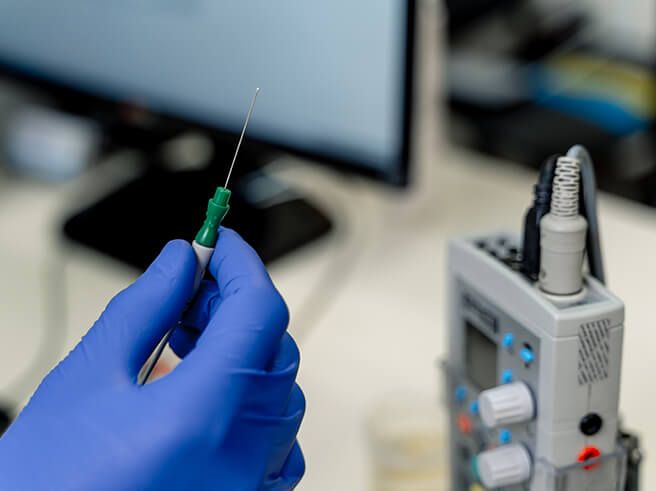Electromyogram (EMG)
Electromyography (EMG), conducted at Associates in Neurology, is a diagnostic procedure designed to assess the health of the muscles and nerve cells (motor neurons) that control them. Your motor neurons transmit electrical signals that make your muscles contract. The results of an EMG can reveal nerve or muscle dysfunction or issues with nerve-to-muscle signal transmission.
An EMG involves the use of tiny electrodes that translate these signals into graphs, sounds, or numerical values that are then interpreted by a neurologic specialist.
During a needle EMG, an electrode is inserted directly into a muscle, which then records its electrical activity.
One of our physicians at Associates in Neurology may order an EMG if you are exhibiting signs that indicate a nerve or muscle disorder. Symptoms include:
- Certain types of pain in arms or legs
- Muscle weakness, pain, or cramping
- Numbness
- Tingling

The results of an EMG test are often helpful in diagnosing or ruling out a variety of conditions, including:
- Amyotrophic lateral sclerosis or polio
- Carpal tunnel syndrome or peripheral neuropathy
- Herniated discs in the spine
- Muscular dystrophy or polymyositis
- Myasthenia gravis
How to Prepare for an EMG
It is necessary that the surface of your skin is clean, dry, and free of any oils, creams, lotions, etc. You can eat any meal as you normally would, as well as take any medication that you normally would. Please inform your doctor if you are on blood thinners of any sort.
What to Expect from an EMG Test
Before an EMG procedure, you may be asked to change into a hospital gown and lie down on the examination table. Depending on where you are experiencing symptoms, the neurologist will place electrodes at various locations on your skin. Or, depending on your symptoms, needle electrodes may be inserted in different sites.
During the EMG study, you may feel an occasional twinge or spasm as the electrodes transmit a tiny electrical current. Otherwise, the procedure is safe and virtually painless. The neurologist assesses whether there is any spontaneous electrical activity when the muscle is at rest and the degree of activity when the muscle contracts.
When an EMG procedure is over, you may experience some minor bruising where the electrode was inserted into your muscle. This is only temporary and will diminish within a few days.
Meanwhile, the neurologist will interpret the result of your test, prepare a report, and submit it to your primary care doctor or the physician who ordered the EMG, who will then discuss the report with you at a follow-up appointment.
EMG Testing in Southeast Michigan
To schedule an EMG at one of our conveniently located offices in Farmington Hills, Novi, or Howell, Michigan, contact Associates in Neurology today at (248) 478-5512 or use our secure online Request an Appointment form.


